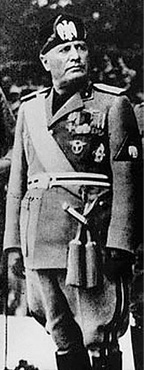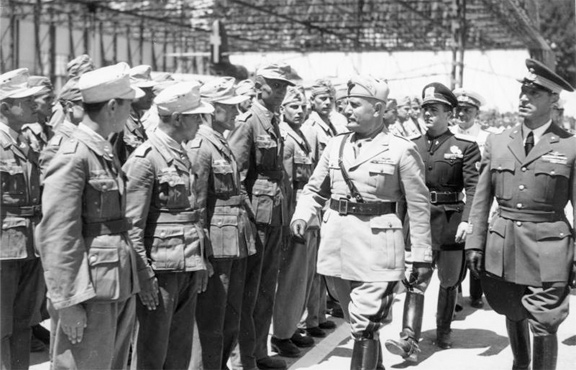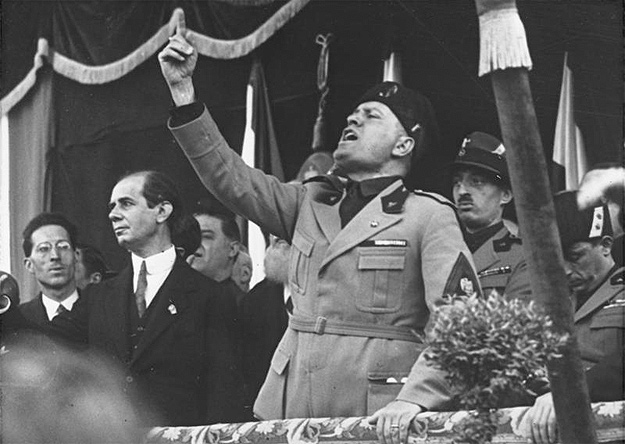
Source: Benito Mussolini in Yugoslavia crop, Muzej Revolucije Narodnosti Jugoslavije, Wikimedia

Source: Benito Mussolini in Yugoslavia crop, Muzej Revolucije Narodnosti Jugoslavije, Wikimedia
In Italy, a man by the name of Benito Mussolini was becoming a household name. Mussolini began his political life like any other concerned citizen. When he became politically active he was very involved in the Socialist Party in Italy (even before WW I), and was editor of his party’s newspaper, Avanti! As WW I began to loom on the horizon, many socialists did not agree that Italy should get involved.
Mussolini, aInteractive popup. Assistance may be required.
A nationalist has strong patriotic pride in his country to the point of believing that other countries are inferior. at heart, disagreed so strongly that he broke with the party. After WW I, Mussolini joined the young National Fascist Party.
at heart, disagreed so strongly that he broke with the party. After WW I, Mussolini joined the young National Fascist Party.
Fascists had several goals, including restoring Italy to its former glory. They stressed that the needs of the state should be above the needs of the individual and the importance of increased military power. Above all, they hated communism. Unlike communists, Fascists still believed in the right to private property and wealth through corporate progress and private investment. Mussolini held these goals very dear, and it did not take him long to rise through the ranks and become the Fascist party leader.

Source: Bundesarchiv Bild 146-2006-0102, Italien, Mussolini vor deutschen Soldaten, Wikimedia
In October of 1922, Mussolini and his followers (his private army known as the Black Shirts) marched on Rome. To the King’s surprise, many important government officials as well as the army sided with Mussolini. King Victor Emanuel III of Italy was pressured into appointing Mussolini as Prime Minister. By 1926, Mussolini had gained enough power to declare himself “Il Duce” or “The Leader”, becoming totalitarian dictator of Italy.

Source: Bundesarchiv Bild 102-09844, Mussolini in Mailand, Wikimedia
Mussolini promised to restore order and glory to Italy. Tourists marveled at the changes saying, “He even made the trains run on time.” However, Totalitarian governments are known for their lack of political freedom often in the form of censorship. Mussolini crushed all who opposed him. In an effort to expand Italy’s economic power, he invaded Ethiopia. This campaign was extremely ruthless and brutal in nature, even using poisonous gases. Many of his allies at the time (such as Britain and France) condemned his actions causing him to look elsewhere for support. He found that support in Germany and later on in Japan.
![]() Below is a list of characteristics of Mussolini’s government. Drag each characteristic into either the “Advantage” or “Disadvantage” column.
Below is a list of characteristics of Mussolini’s government. Drag each characteristic into either the “Advantage” or “Disadvantage” column.